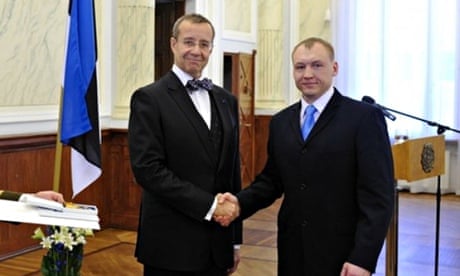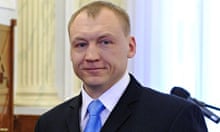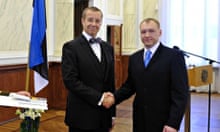The Estonian-Russia border at Luhamaa does not look like a new Checkpoint Charlie. Set among the wooded plains that mark Nato and the European Union's eastern-most territory, the crossing is more likely to be the site of long lines of idling lorries than machine-gun nests and prisoner exchanges.
But that era of post-cold war calm may have come to an end on Friday morning, when, according to several Estonian accounts, smoke grenades detonated at an Estonian customs post, and all radio and telephone signals were jammed as armed Russian men suddenly materialised and dragged away a local official.
His name is Eston Kohver, a counter-intelligence officer in the Estonian security agency, Kapo, whose job over the past few years has been to keep tabs on the smuggling cartels trying to sneak merchandise through the Luhamaa crossing.
But Kohver's fate has now become entangled in a much bigger issue: the question of just how far Vladimir Putin's Russia is prepared to go to goad the Nato allies on its doorstep.
The capture has been seen as particularly provocative because it came two days after the US president, Barack Obama, visited Estonia, a trip aimed at reassuring the Baltic states of the US commitment to the security of its Nato allies in the face of Russia's role in the Ukraine crisis. It followed the announcement of the creation of a "spearhead force" – a Nato unit of 4,000 soldiers to be tasked with defending Baltic countries including Estonia.
But the immediate reaction of the government in Tallinn was to play down Friday's incident in the hope that it was the work of local Russian commanders who have a record of involvement in the smuggling trade.
The Kapo chief, Arnold Sinisalu, issued a statement saying there appeared to be no political motivation behind the incident. Estonia's president, Toomas Hendrik Ilves, tweeted that: "Kapo, like FBI in US, deals both with counterintelligence *and* organized crime. Just in some places they turn out to be same."
The hope that the affair would turn out to be low-key was initially strengthened when Estonian and Russian border guards performed a joint inspection, which seemed to verify the evidence of an incursion from Russia into Estonia, including multiple footprints in a band of raked sand that runs through no-man's land.
By Sunday, however, it became increasingly clear that Russia had other ideas. The Estonian was taken to Moscow where he was paraded before television cameras. The Russian Federal Security Service, the FSB, successor to the Soviet KGB, claimed Kohver had been caught on Russian soil.
The FSB said in a statement: "A Taurus handgun with ammunition, €5,000 (£4,000) in cash, special equipment for concealed audio recording and documents that bear evidence of an intelligence mission were seized from the intruder."
The statement appeared ominous for Kohver, whom the FSB had identified as a Kapo officer as far back as 2011, saying he was one of several agents trying to recruit agents as they crossed the border. The decision to bring him to Moscow and put him on television made it clear that Moscow was not interested in finding a quick and quiet means of resolving the incident.
Kadri Liik, a policy fellow at the European Council on Foreign Relations, said: "My first guess was that this was to do with cross-border smuggling which happened to be sponsored by the Russian security services, which wouldn't be that unusual. The lines are pretty blended. It could be that Kohver got in the way of a business deal, but if it is business, it's clearly a business with Moscow connections."
The question of Kohver's future now looks likely to become a lever for a resurgent Russia to work on its small Baltic neighbour, which at last week's Nato summit declared itself in favour of hosting a new Nato base.
"This is not something cooked up the day before yesterday," said Eerik-Niiles Kross, a former Estonian intelligence chief and national security advisor. "I don't know if it was an FSB shady deal that went wrong, but whatever it was, you have to put it in the general context. The timing is either an odd coincidence, or it is a signal."
There is nothing new about Estonia and Russia conducting spy operations against each other. President Ilves recently claimed Estonia had unmasked four Russian moles in the past five years. In 2008, it was discovered that the top security official in the Estonian defence ministry, Herman Simm, was a Russian agent. In the past two years, Kapo found two more double agents in its own ranks.
In 2007, Estonian government institutions came under a series of crippling cyber-attacks which Tallinn blamed on Russia, but which Moscow denied. In 2008, an ethnic Russian living in Estonia was fined for his part in the attacks.
But the Kohver incident points towards a new gloves-off approach by the FSB.
"I don't know of any other incident of a foreign national being taken on foreign soil. To kidnap a Nato country's intelligence official on foreign territory is unprecedented," Kross said. Nevertheless, he added, raising the stakes would be unlikely to help Kohver. "No one is interested in bringing Nato in on a practical level. The aim will be to try to deal with this on a local, bilateral level."
Marko Mihkelson, the chairman of the foreign affairs committee in the Estonian parliament, agreed that it did not serve the country's interests to escalate the issue into an international crisis. said: "It seems the Russians are trying to paint this event into a bigger story. I don't want to speculate on their aims, but remember they have done these kinds of acts that affect the sovereignty of other countries," Mihkelson said. "But we have been dealing with difficult issues with Russia for years. I don't see the need now for a bigger action. But we'll strengthen the border and keep our eyes open."



